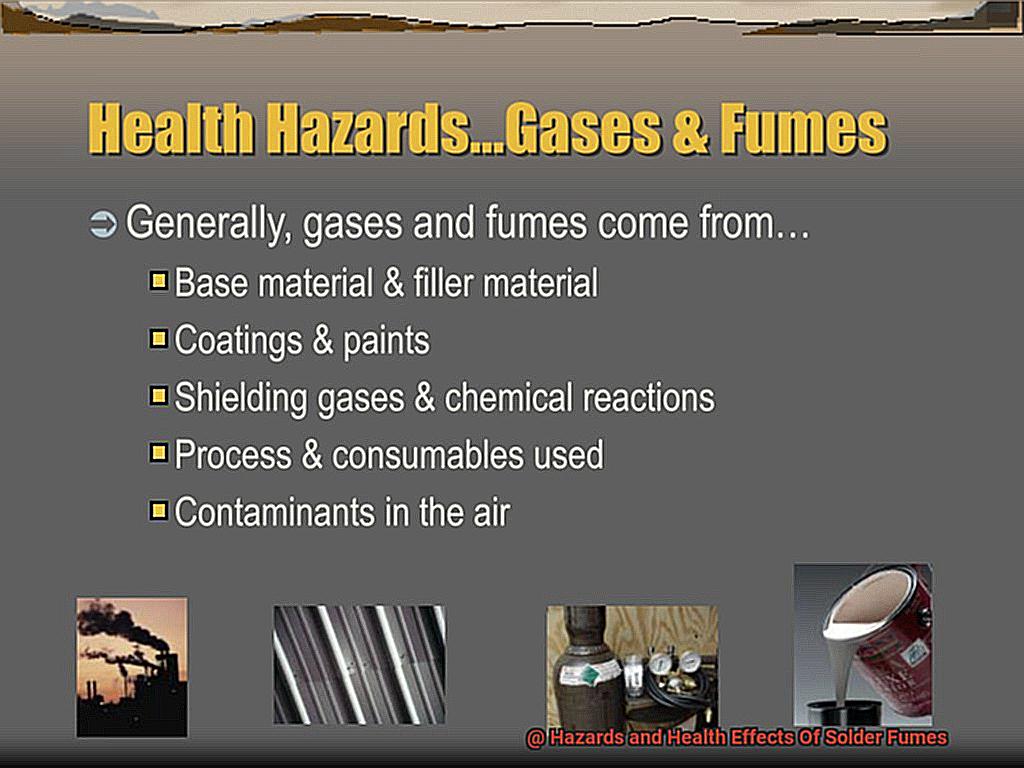Soldering is a crucial process in the world of electronics, but it comes with a hidden danger that cannot be ignored.
The fumes produced during soldering are often overlooked, yet they can cause severe health problems if inhaled repeatedly. In this blog post, we will delve into the hazards and health effects of solder fumes and emphasize the importance of adopting safety measures while working with solder.
Exposure to solder fumes can lead to respiratory issues, eye and skin irritation, and even long-term health problems such as asthma, pulmonary and lung diseases. These dangers stem from the metal alloys used in the soldering process, including lead, copper, zinc, and cadmium.
When these metals are heated and inhaled as fumes, they can cause irreversible damage to your body. To avoid these negative health effects, it’s crucial to take safety measures such as proper ventilation systems, personal protective equipment (PPE), and safe work practices.
By taking these precautions seriously, you can protect yourself from the dangers of solder fumes. In this post, we’ll go beyond just discussing the risks of soldering; we’ll provide you with practical advice on how to safeguard your health while working with solder.
So, let’s get started.
What are Solder Fumes?
Contents
Solder fumes may seem harmless, but they are actually hazardous airborne particles that can pose a serious risk to human health.
Solder fumes refer to the gases and tiny particles released when heated metal alloys, such as lead and tin, are melted together to join two metals.
The composition of solder fumes varies depending on the type of solder and the temperature at which it is melted. Solder fumes contain a variety of components including lead, tin, and flux, which is used to help the solder flow more easily.
Additionally, when solder is heated, it releases harmful gases such as nitrogen oxides, carbon monoxide, and ozone. The presence of these gases and other chemicals in solder fumes can cause short-term symptoms such as coughing, sneezing and headaches.
Long-term exposure to these fumes can lead to severe health issues such as lung damage or even cancer. One of the most significant concerns with solder fumes is the presence of lead.
Lead is a toxic substance that accumulates in the body over time and can cause brain damage, developmental delays, and other severe health problems. It is crucial for individuals who work with solder or are exposed to its fumes to take adequate precautions to protect themselves from its harmful effects.
To ensure worker safety, it is essential to use proper ventilation systems or wear personal protective equipment such as respirators and gloves while working with solder.
Employers should also provide training on safe soldering practices and ensure that workers have access to personal protective equipment.
They pose a significant risk to human health and can have severe long-term consequences.
Short-term Health Effects of Solder Fumes
It’s crucial to understand that solder fumes contain harmful substances such as lead, rosin-based fluxes, copper, silver, and zinc.
The type of solder, duration and frequency of exposure, and individual sensitivity can all impact the range of health effects. Respiratory irritation is a common short-term effect of solder fume exposure.
This can lead to coughing, wheezing, and shortness of breath. These symptoms are usually temporary and will go away once the exposure is stopped.

However, repeated or prolonged exposure can cause chronic respiratory issues like asthma or bronchitis. In addition to respiratory irritation, solder fume exposure can also cause eye and throat irritation.
This can result in redness, itching, swelling, soreness, headaches, and even nausea. Moreover, chemicals used in soldering like rosin-based fluxes can cause skin irritation or rashes if they come into contact with the skin.
To protect yourself from these short-term health effects, it’s essential to take precautions while working with solder. Proper ventilation systems must be used to reduce exposure to fumes.
Long-term Health Effects of Solder Fumes
Solder fumes contain various metals such as lead, cadmium, and zinc that can accumulate in your body over time and result in chronic conditions.
Lead poisoning is one of the most serious long-term health effects of solder fumes. This metal is commonly found in solder alloys and can cause severe damage to your brain and nervous system if inhaled over an extended period.
Symptoms of lead poisoning include fatigue, headaches, memory loss, seizures, and more. This condition can have long-term effects if not treated promptly, making it crucial to take proper precautions.
Cadmium exposure is another significant concern for individuals who frequently work with soldering equipment. This metal can cause lung cancer, kidney damage, and bone disease.
It stays in your body for up to 30 years after exposure, which is why taking necessary precautions is vital. Zinc is also present in solder fumes and can cause respiratory problems such as asthma and bronchitis.
Long-term exposure to zinc can even lead to a condition called metal fume fever, which causes flu-like symptoms. Protecting yourself from these harmful fumes is crucial.
Lead in Solder Fumes

When heated, lead vaporizes and becomes toxic fumes that can easily be inhaled by workers.
This puts them at risk for lead poisoning, which can cause a range of health problems from anemia and abdominal pain to fatigue and memory loss. In severe cases, it can even lead to death.
Don’t let the risks scare you, though. There are several steps you can take to reduce your exposure to lead in solder fumes.
First and foremost, proper ventilation is key. Ensure you are working in a well-ventilated area or use an exhaust system to remove the fumes from the air.
Personal protective equipment (PPE) is also essential. Employers should provide workers with respirators or air-purifying respirators specifically designed for lead exposure.
Workers should also wear gloves and protective clothing to minimize skin contact with lead-containing materials. Another way to minimize exposure is by using alternative solders that don’t contain lead.

These alternatives often contain other elements such as silver or copper, which are less toxic than lead.
Other Chemicals in Solder Fumes
Soldering is a critical component of many industries, but the fumes produced during the process can be hazardous to your health.
While lead is often the primary concern when it comes to solder fumes, other chemicals in these fumes can also pose significant risks. One of these harmful chemicals is flux fumes, created by the heating and vaporization of the flux used in the soldering process.
These fumes can contain rosin, which can cause respiratory irritation and allergic reactions in some individuals. Other chemicals commonly found in solder fumes include zinc oxide, copper oxide, and tin oxide.

These chemicals can irritate the respiratory system, leading to symptoms like coughing, wheezing, and shortness of breath. Prolonged exposure to these chemicals can even cause serious respiratory problems such as asthma and bronchitis.
But it’s not just your lungs that are at risk – your eyes are also vulnerable to solder fumes. Exposure to these fumes can cause redness, itching, and watering of the eyes, potentially leading to vision problems if left unchecked.
To protect yourself from these harmful chemicals, it’s crucial to take proper precautions. This includes using proper ventilation systems or wearing respiratory protection like a mask or respirator while working with solder.
Safety Measures for Reducing Exposure to Solder Fumes
Soldering is a vital process in many industries, but it can also pose a significant health risk due to the fumes produced during the process.
These fumes contain hazardous chemicals that can cause respiratory problems, allergic reactions, and even vision issues. However, with the right safety measures in place, you can minimize your exposure to these harmful fumes and protect your health.
Proper ventilation is one of the most critical safety measures when working with soldering materials. A well-ventilated work area helps to reduce the concentration of solder fumes in the air.
You can achieve good ventilation by opening windows or using a fume hood or extractor. This simple step can go a long way in ensuring your safety.
Personal protective equipment (PPE) is another essential element to consider when working with soldering materials. Respiratory masks or respirators, gloves, and eye protection can help protect against inhalation or contact with the soldering materials.
Wearing PPE is crucial for minimizing your exposure to harmful chemicals, so make sure you use it every time you work with soldering materials. Limiting exposure time is another vital safety measure when working with soldering materials.
Taking frequent breaks, working in short intervals, and rotating work tasks can help reduce your duration of exposure to solder fumes. By doing this, you give your body enough time to recover from any adverse effects of solder fumes.
Proper handling and storage of solder materials are also crucial for minimizing exposure to harmful fumes. Always store solder materials in a well-ventilated area away from heat sources and direct sunlight.
Make sure you avoid touching or ingesting solder materials at all times. Lastly, providing employees with proper training on how to handle and work with solder materials safely is crucial.
This includes proper ventilation methods, PPE use, and handling procedures. With proper training, you can ensure that everyone in your team understands the risks associated with soldering materials and knows how to take the necessary precautions.
So, taking necessary precautions when working with soldering materials is vital to reduce exposure to hazardous fumes.
By implementing safety measures such as proper ventilation, PPE use, limiting exposure time, handling and storing solder materials correctly, and providing employees with proper training, you can protect your health while still performing your job efficiently.
GI3iDmpQ8Fg” >
Conclusion
In conclusion, solder fumes are a serious health hazard that should not be taken lightly.
The chemicals present in these fumes, such as lead, cadmium, and zinc, can cause both short-term and long-term health problems if inhaled repeatedly. These issues include respiratory irritation, eye and skin irritation, lung damage, cancer, brain damage, developmental delays, and more.
To protect yourself from the dangers of solder fumes while working with these materials, it is essential to take safety measures seriously. This includes implementing proper ventilation systems and using personal protective equipment (PPE) to limit exposure time.
Additionally, handling and storing solder materials correctly and providing employees with proper training can go a long way in safeguarding your health. By following these precautions diligently, you can minimize your exposure to harmful fumes and protect your health in the short term as well as the long term.
Remember that prevention is always better than cure when it comes to the hazards of solder fumes. Whether you are a professional or a hobbyist working with soldering materials, prioritizing safety should be at the forefront of your mind.





